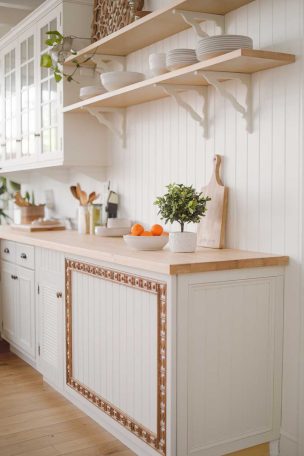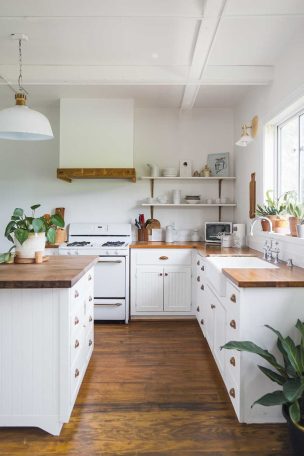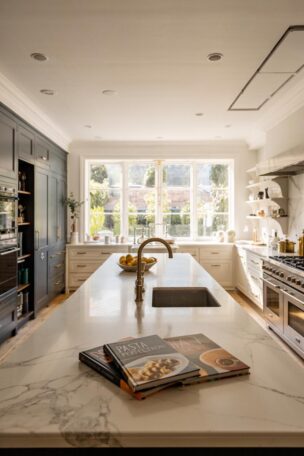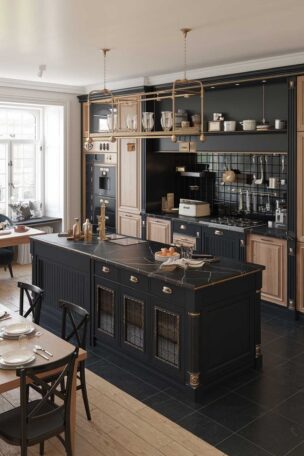Minimalist kitchen design has become the cornerstone of contemporary home aesthetics.
This approach strips away unnecessary elements, leaving behind clean surfaces, purposeful storage, and a sense of calm that transforms cooking spaces into serene retreats.
The beauty lies in its simplicity—every element serves a purpose, creating environments that are both visually striking and highly functional.
Pristine White Haven with Natural Accents
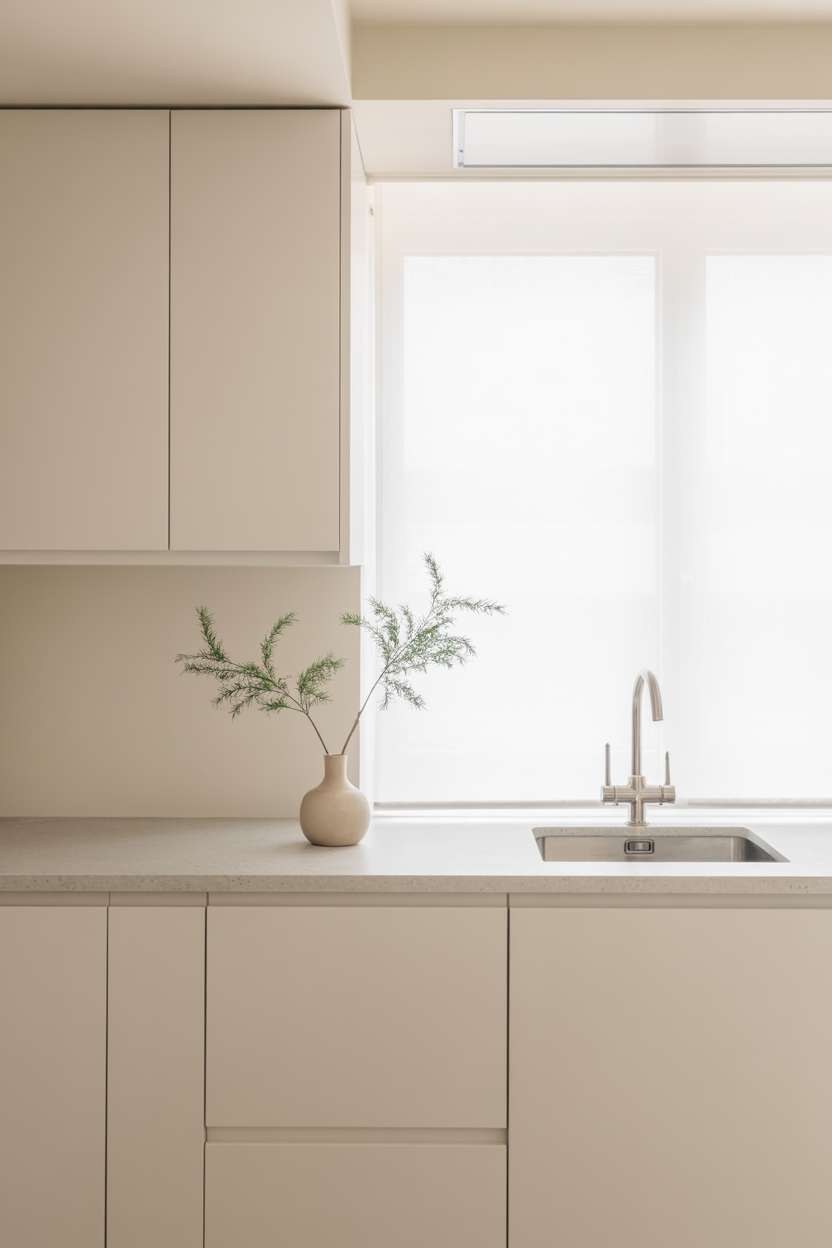
This pristine white kitchen showcases how neutral palettes create timeless appeal.
The integrated handles maintain the sleek aesthetic, while the single vase of greenery prevents the space from feeling sterile.
Natural light becomes the hero here, bouncing off smooth surfaces and creating subtle shadows that add depth without clutter.
Island-Centered Modern Sanctuary
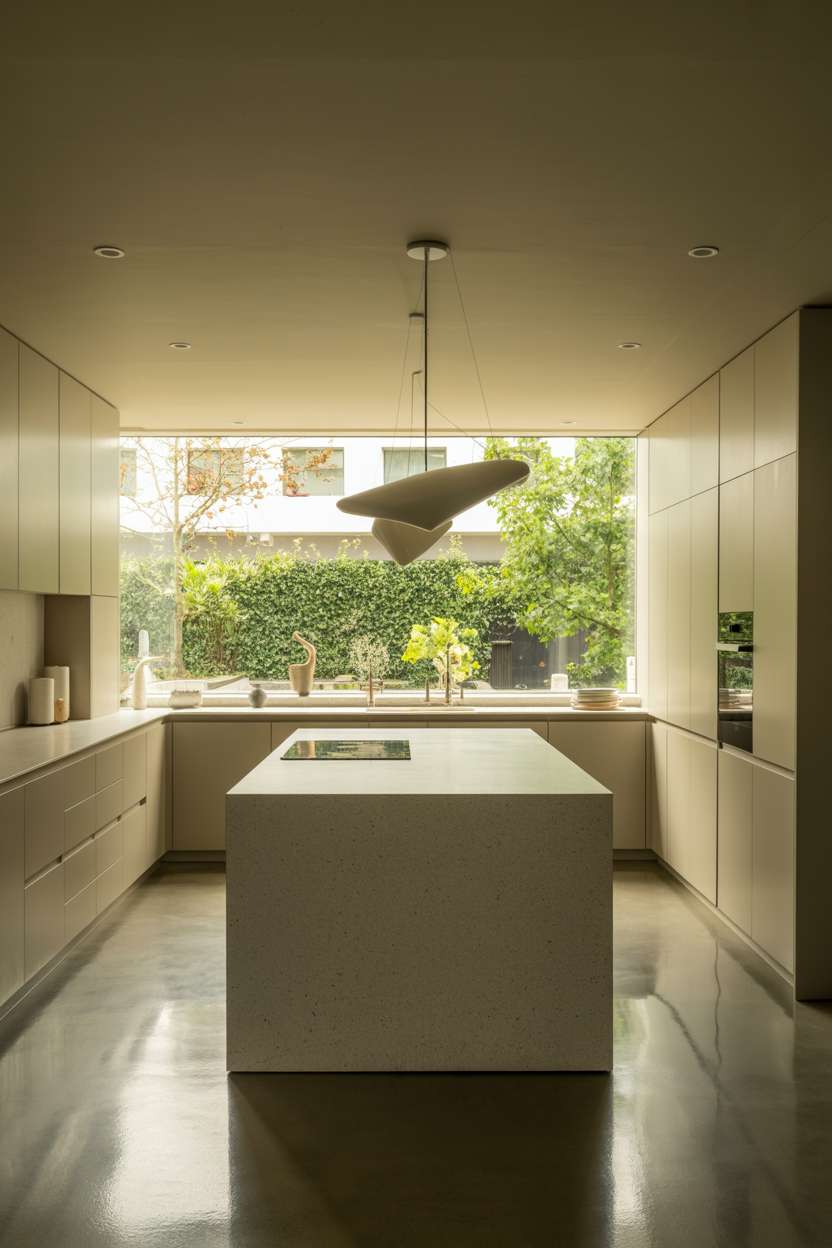
Large islands serve as both workspace and gathering point in this design.
The handleless cabinetry creates uninterrupted lines, while the single pendant light provides focused illumination.
The garden view through expansive windows brings nature indoors, softening the hard edges of modern materials.
Seamless Integration with Outdoor Views
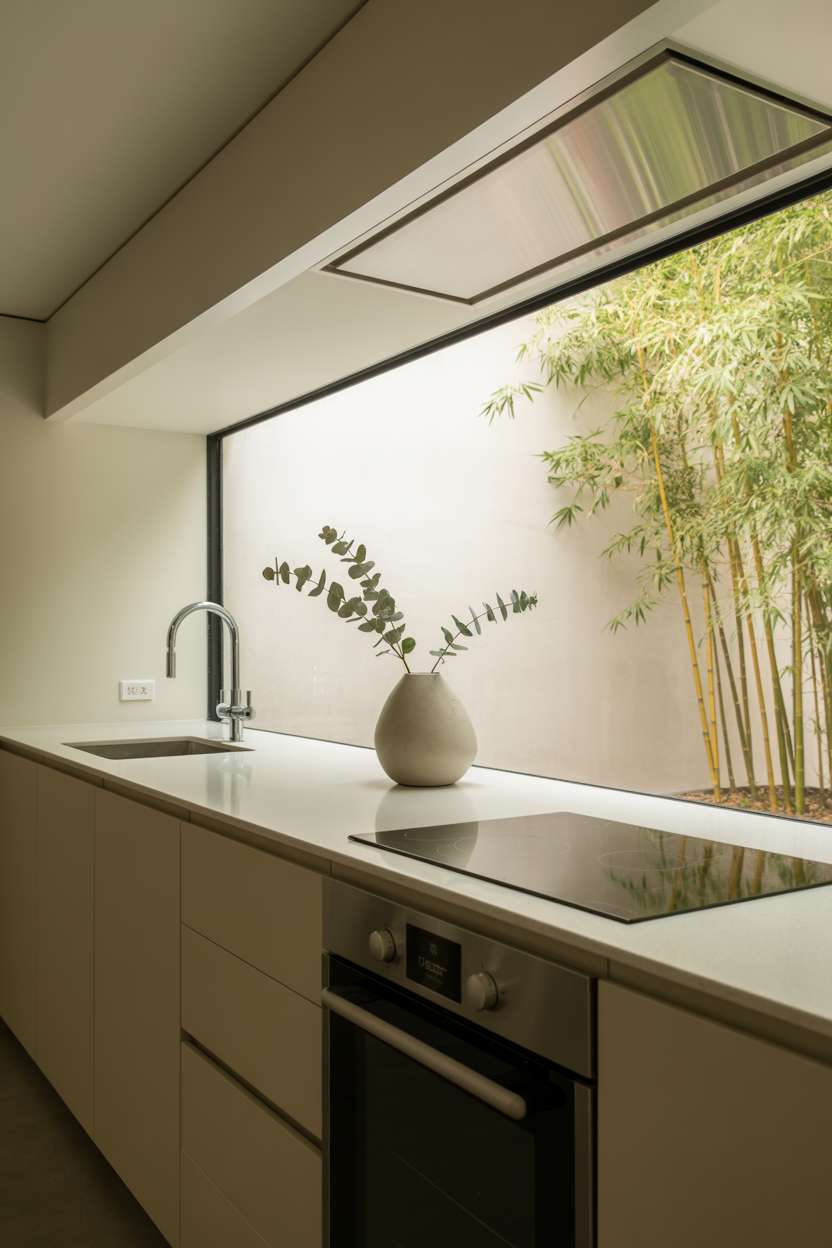
Integrated appliances disappear into the design, maintaining clean lines throughout.
The eucalyptus arrangement adds organic texture without overwhelming the space.
This approach works particularly well in homes where the kitchen opens to outdoor areas, creating seamless indoor-outdoor living.
Garden-Connected Cooking Space
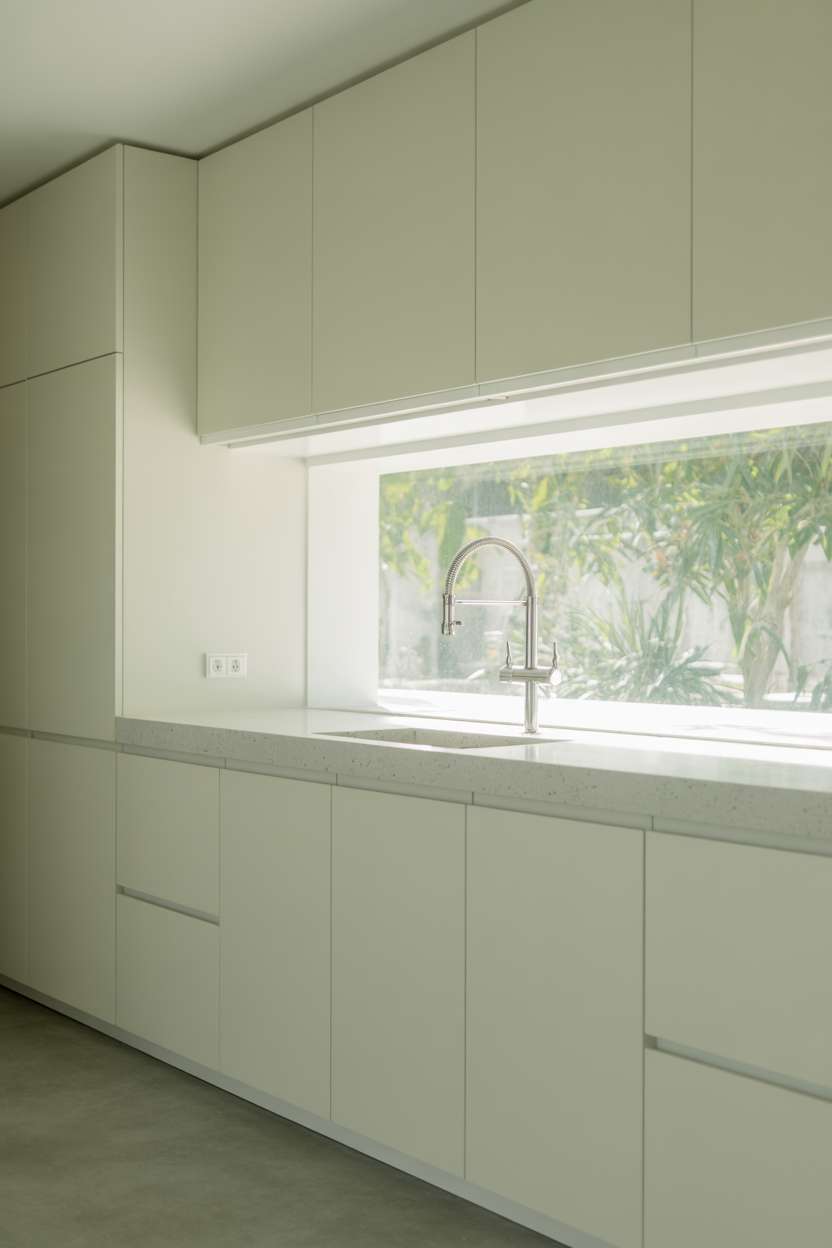
A single statement faucet becomes sculptural when surrounded by such restraint.
The polished concrete flooring adds industrial warmth while remaining practical for high-traffic areas.
This design proves that minimalism doesn’t mean sacrificing personality—it just means being selective about where personality shines through.
Marble Elegance with Natural Light
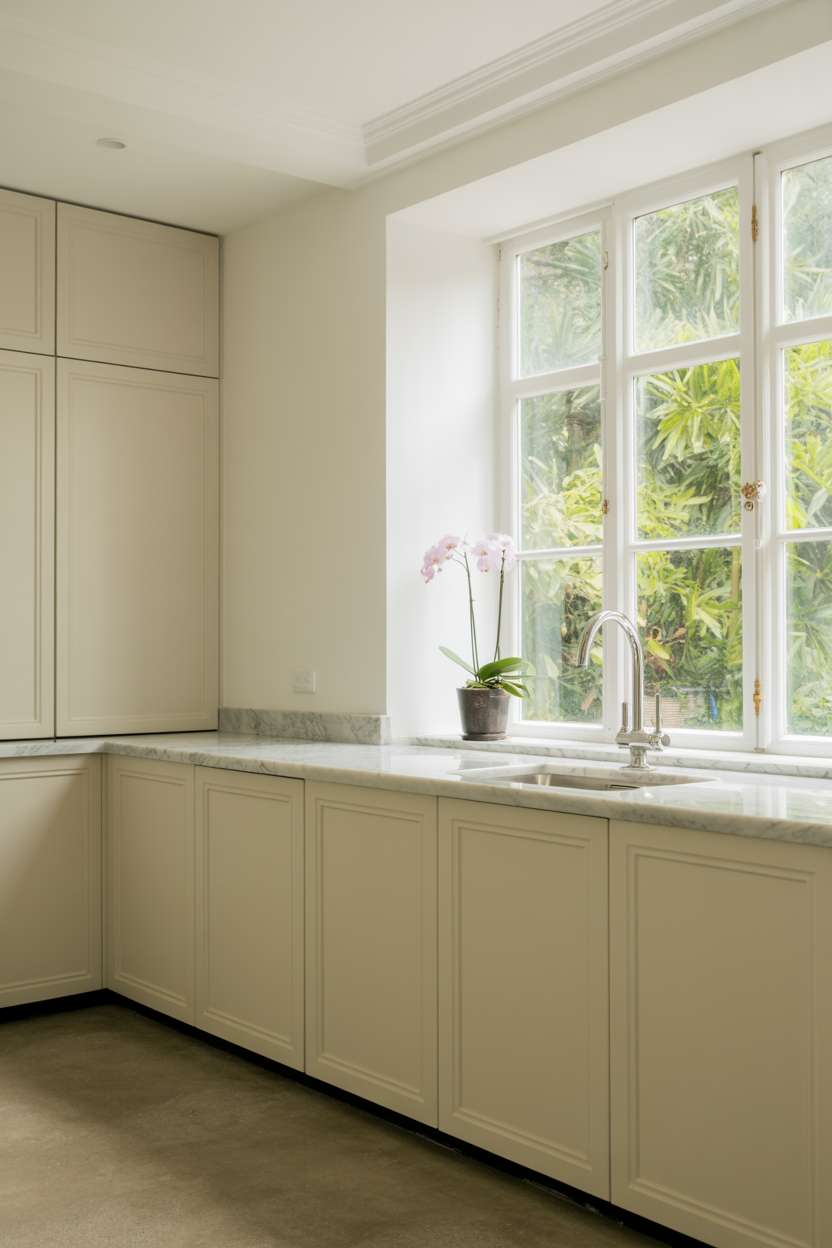
Carrara marble introduces natural veining that adds visual interest without compromising the clean aesthetic.
The single orchid provides a pop of color that changes with the seasons.
This combination of natural materials and living elements creates warmth within the minimalist framework.
Expansive Open Concept Design
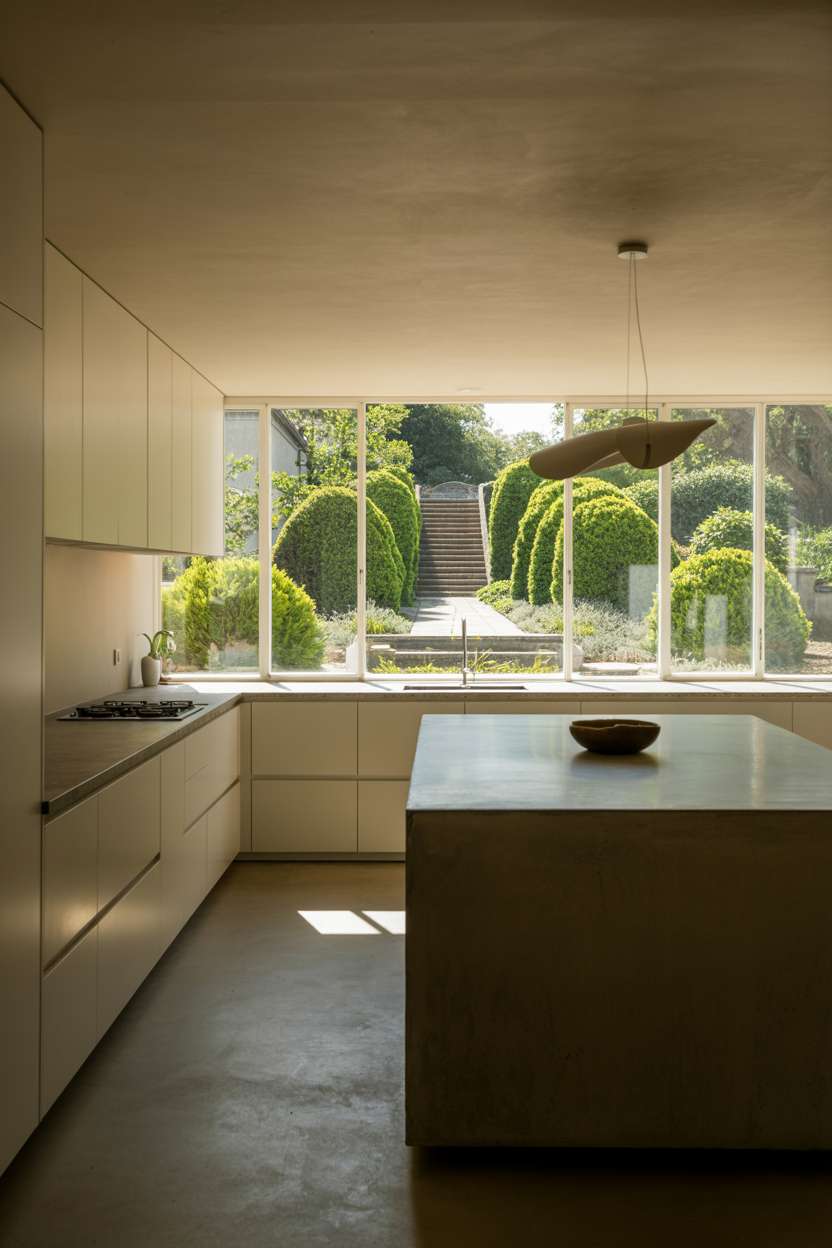
Distance shots reveal how minimalist kitchens integrate with the broader living space.
The low island maintains sight lines while providing additional prep space.
The stone garden path visible through the windows creates a natural extension of the interior materials palette.
Wood and Stone Harmony
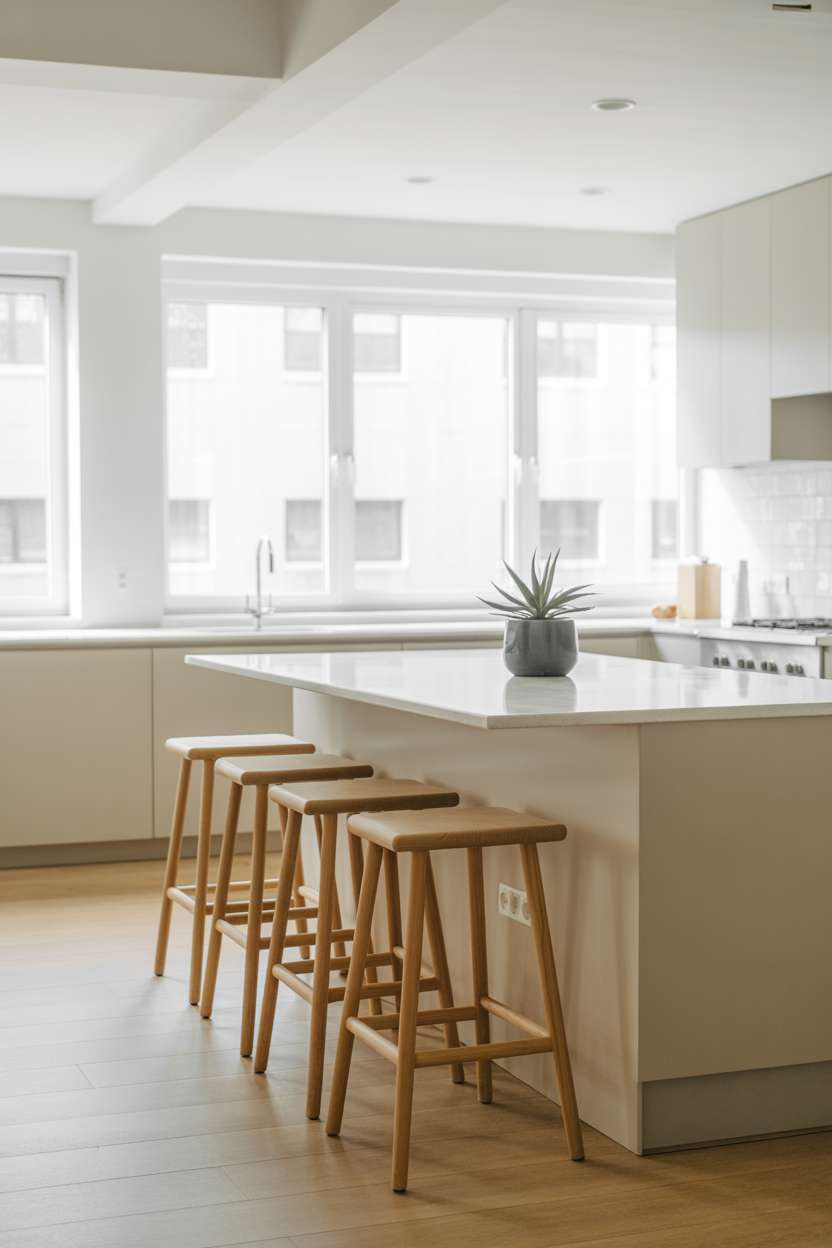
Natural wood stools soften the hard surfaces while maintaining the clean aesthetic.
Light oak flooring adds warmth without competing with the cabinetry.
This balance between cool and warm tones creates inviting spaces that still feel serene and organized.
Sophisticated Gray Palette
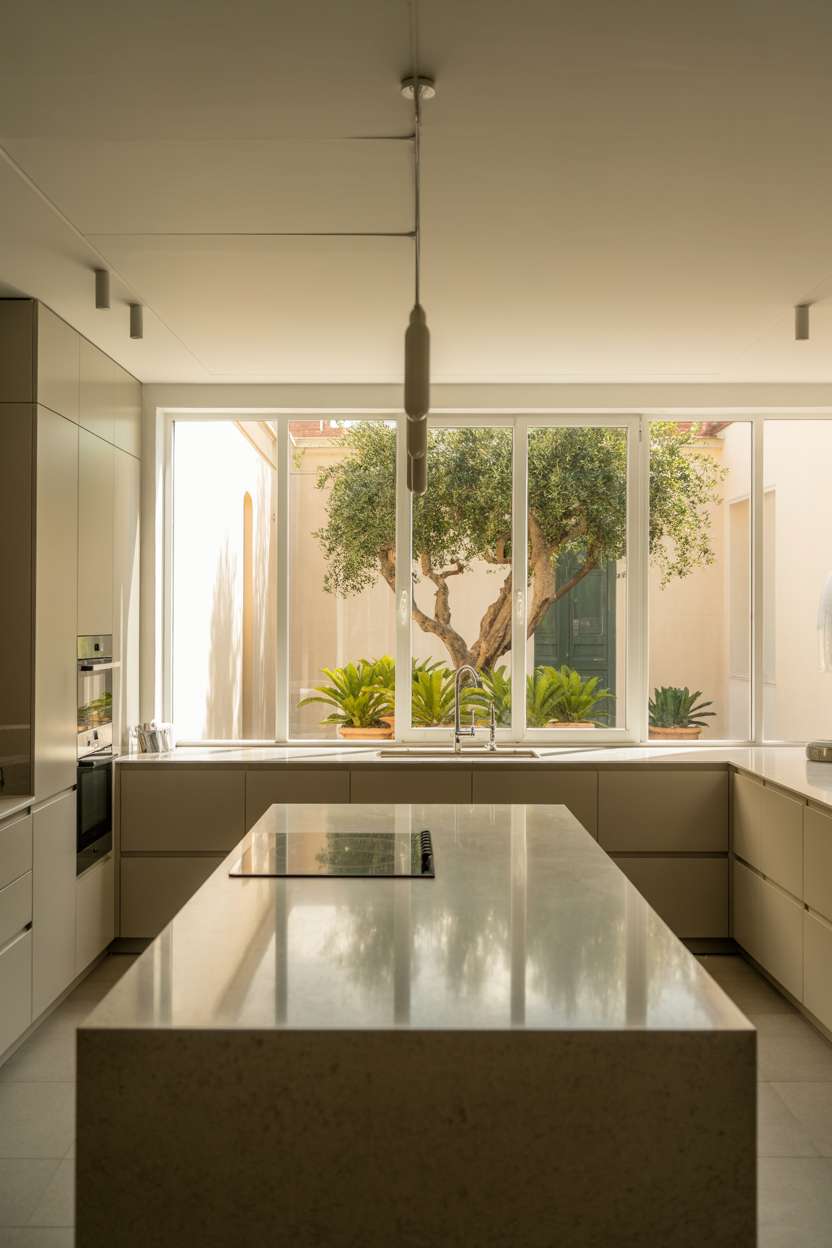
Waterfall countertops create dramatic focal points while serving practical purposes—they protect cabinet ends and create visual continuity.
The matte gray finish hides fingerprints better than glossy surfaces while maintaining sophistication.
Olive trees in the courtyard add Mediterranean flair.
Dark Contrast Statement
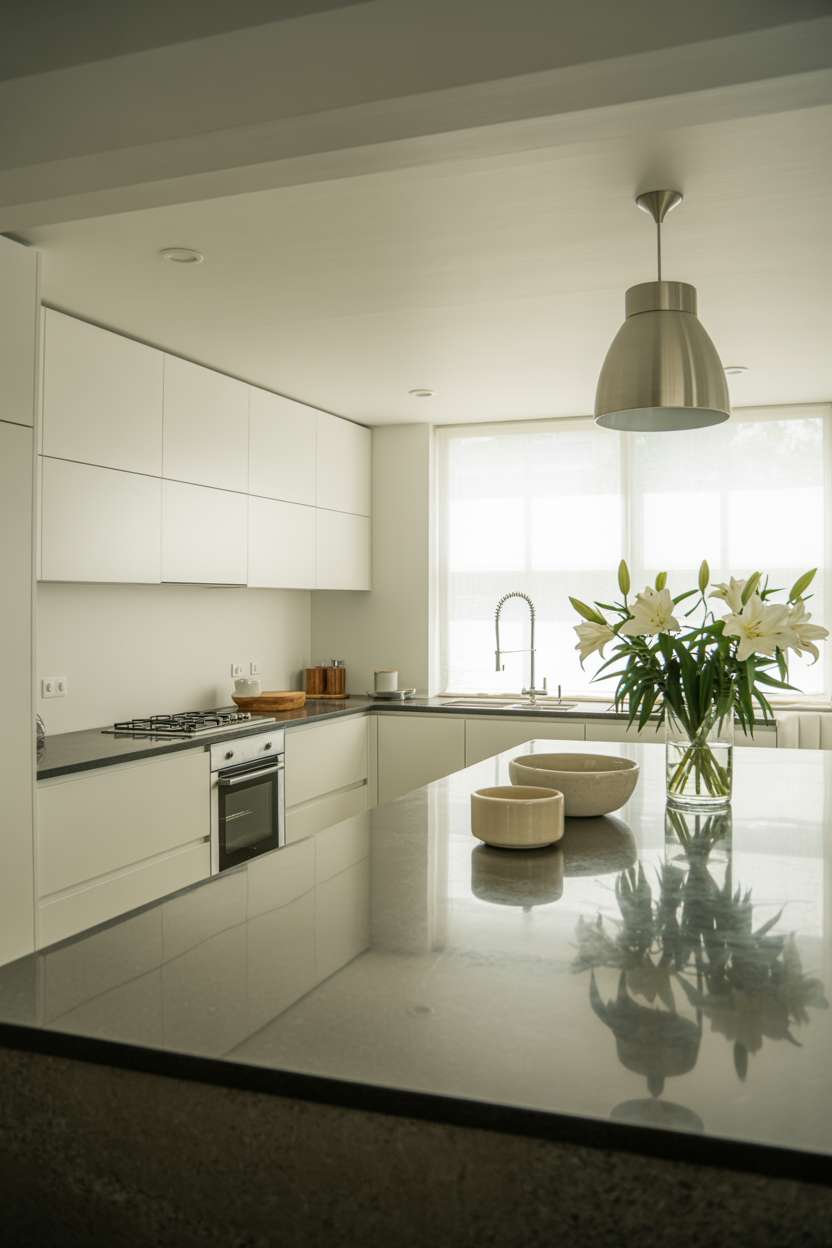
Dark countertops paired with white cabinetry create a striking contrast that doesn’t overwhelm the space.
The polished concrete surface develops character over time while remaining practical for daily use.
White lilies complement the monochromatic palette while adding life to the composition.
Warm Industrial Elements
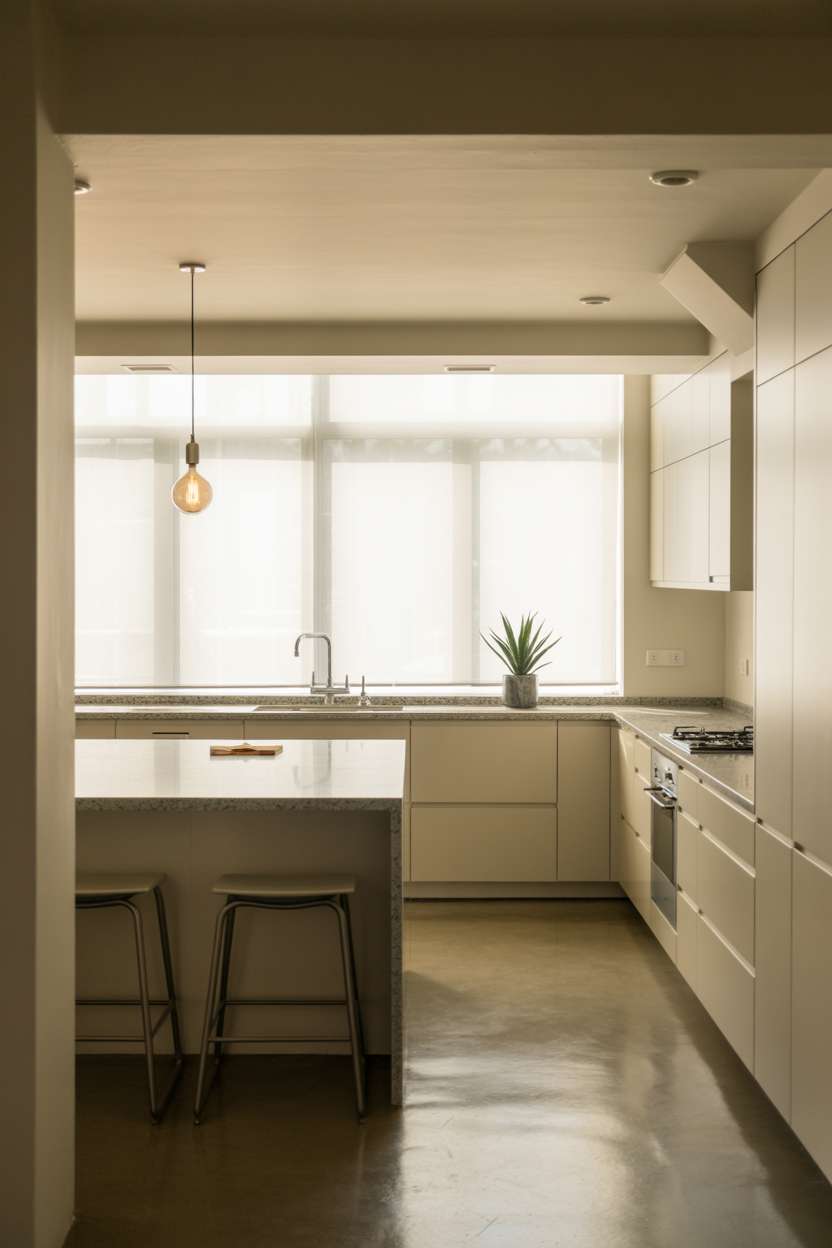
Edison bulbs introduce warmth through their amber glow, softening the crisp white surfaces.
Brushed steel hardware adds subtle texture while remaining understated.
The combination creates industrial warmth that feels approachable rather than cold.
Soft Gray Sophistication
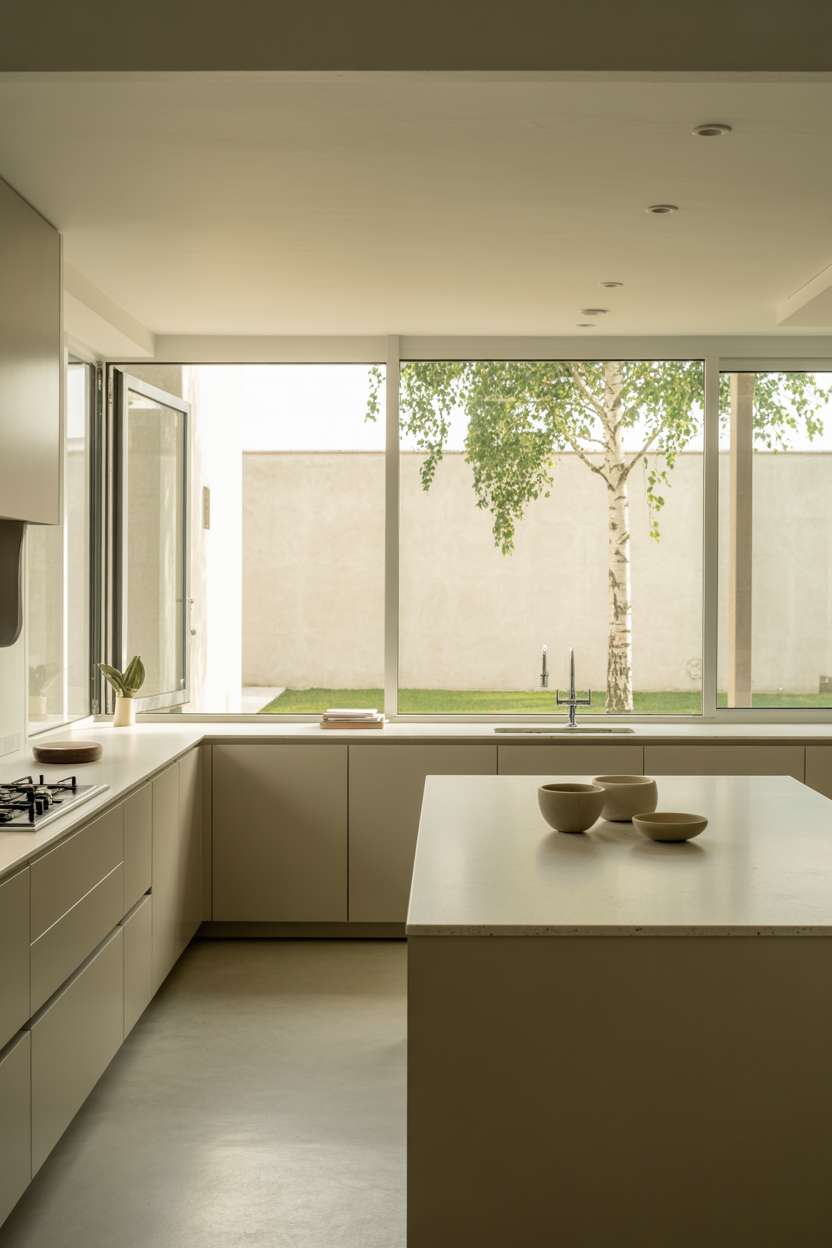
Soft gray tones bridge the gap between stark white and dramatic black, creating sophisticated neutrals that work with any decor.
The birch tree view connects the space to nature, while the ceramic bowls suggest the kitchen’s active use for cooking and entertaining.
Cream-Toned Warmth
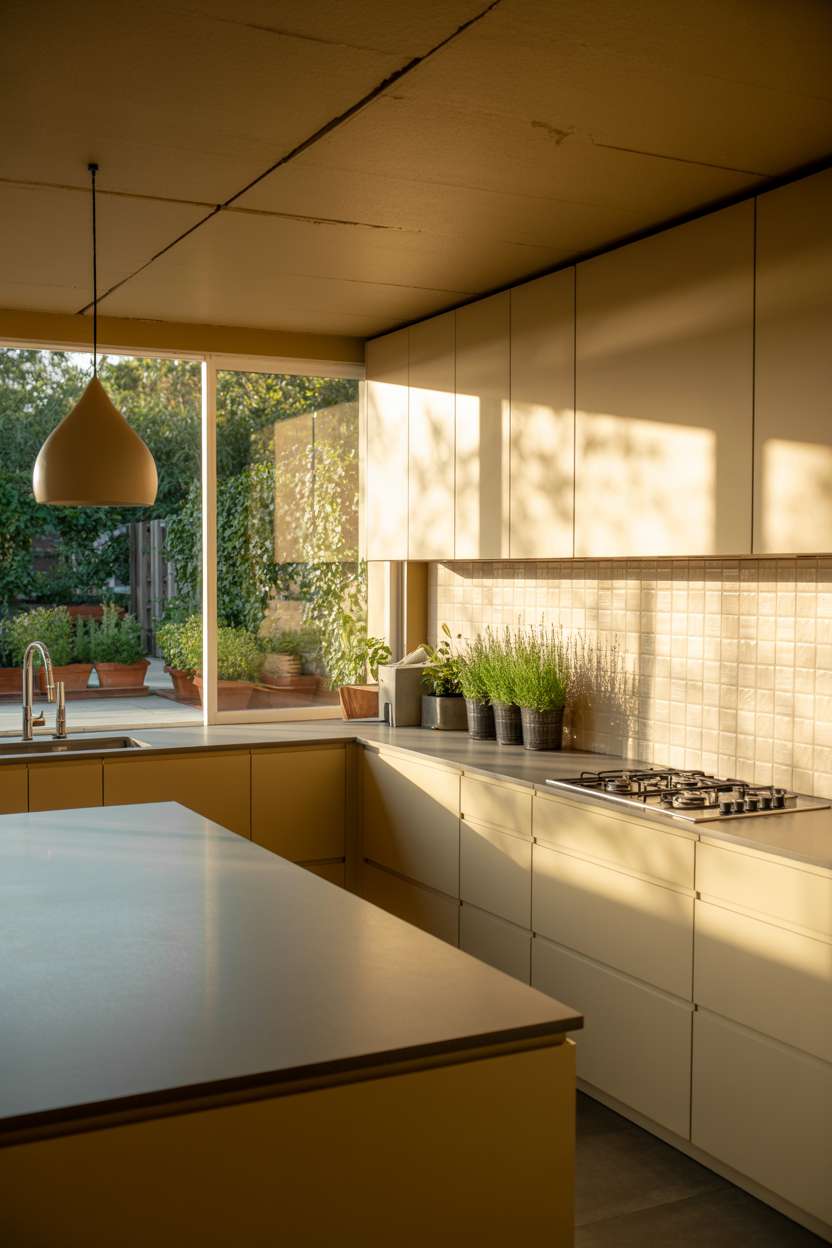
Cream cabinetry offers warmth without sacrificing the clean aesthetic.
Textured ceramic tiles add subtle interest to backsplashes while remaining easy to clean.
The herb garden view suggests fresh cooking and connects the kitchen to its primary function.
Olive Tree Accent Statement
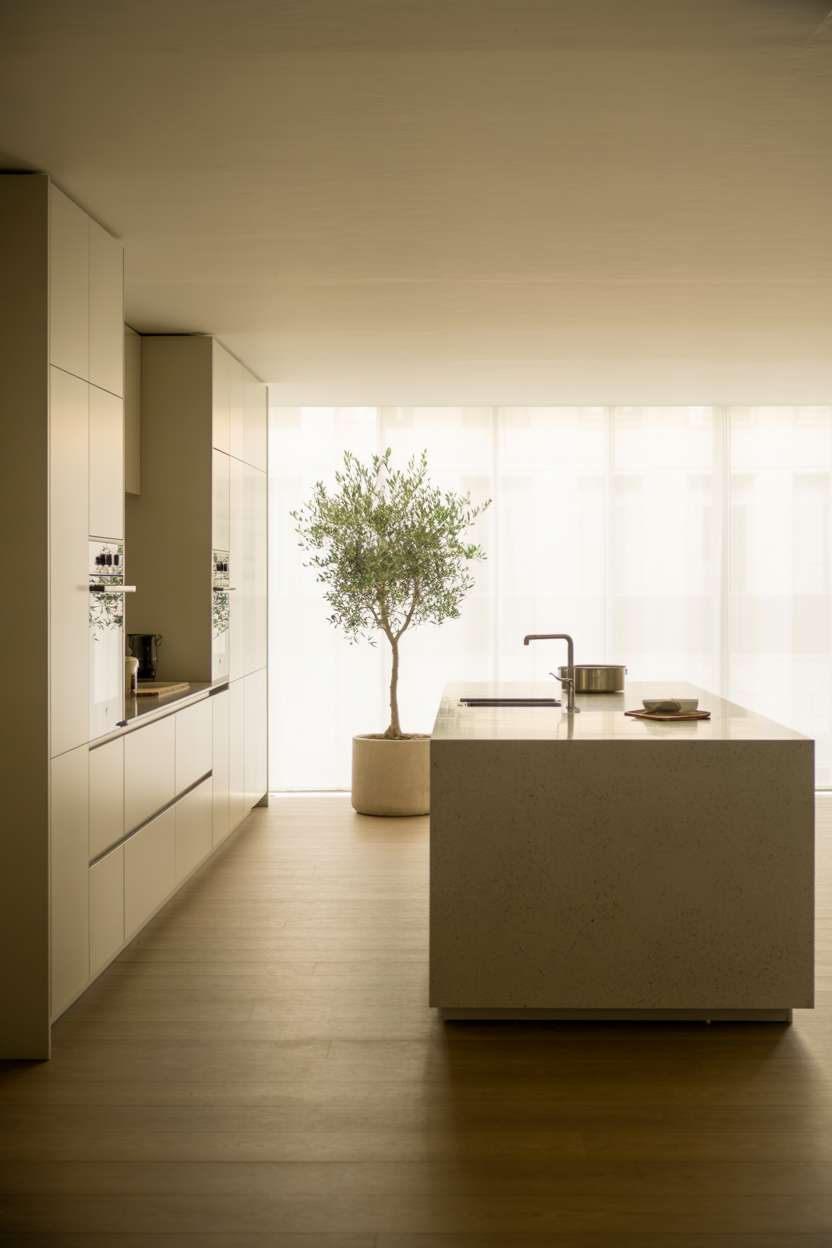
Single statement plants like olive trees add Mediterranean elegance while remaining manageable for busy homeowners.
Light oak flooring provides warmth underfoot and complements the silvery-green foliage.
This approach brings nature indoors without creating maintenance challenges.
Seamless Living Integration
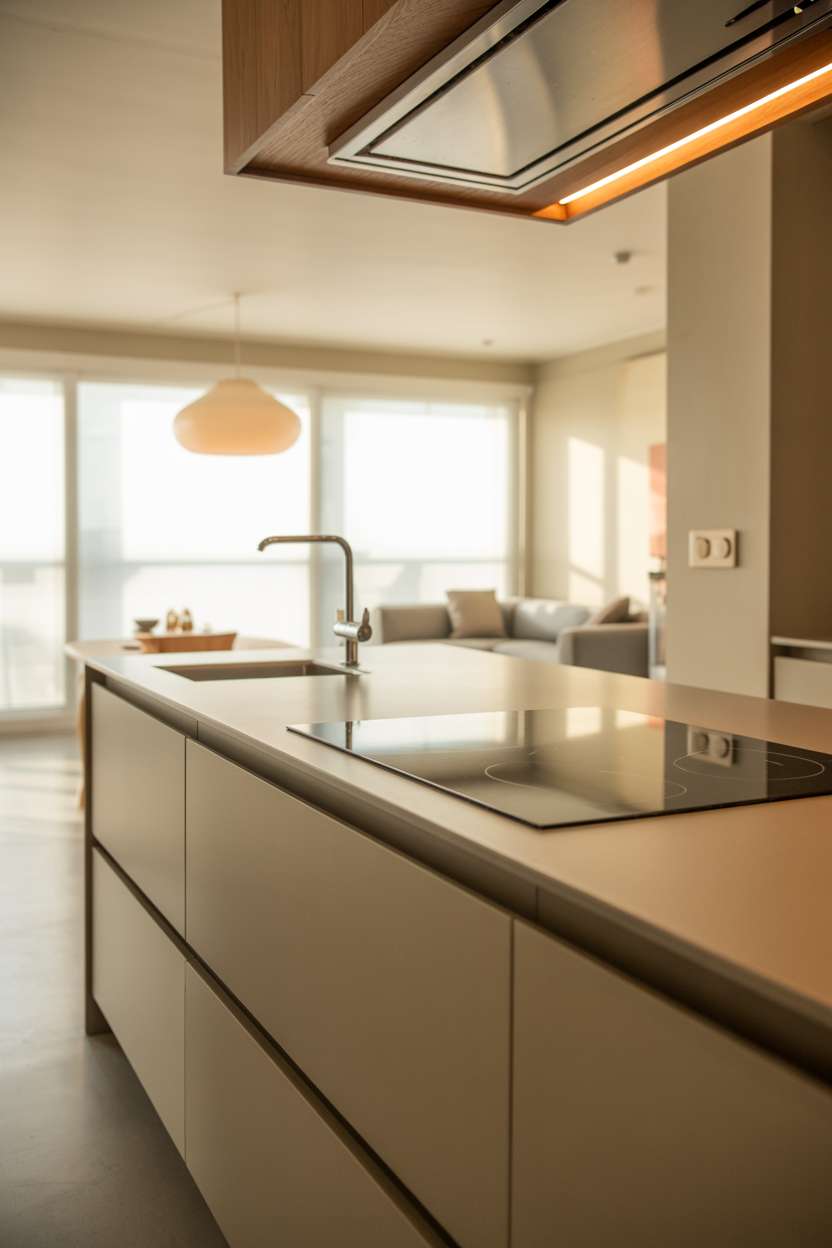
Induction cooktops maintain smooth surfaces while providing efficient cooking.
The waterfall edge with wood grain texture adds tactile interest without disrupting clean lines.
Open concept layouts allow cooking spaces to flow naturally into living areas.
Exposed Brick Character
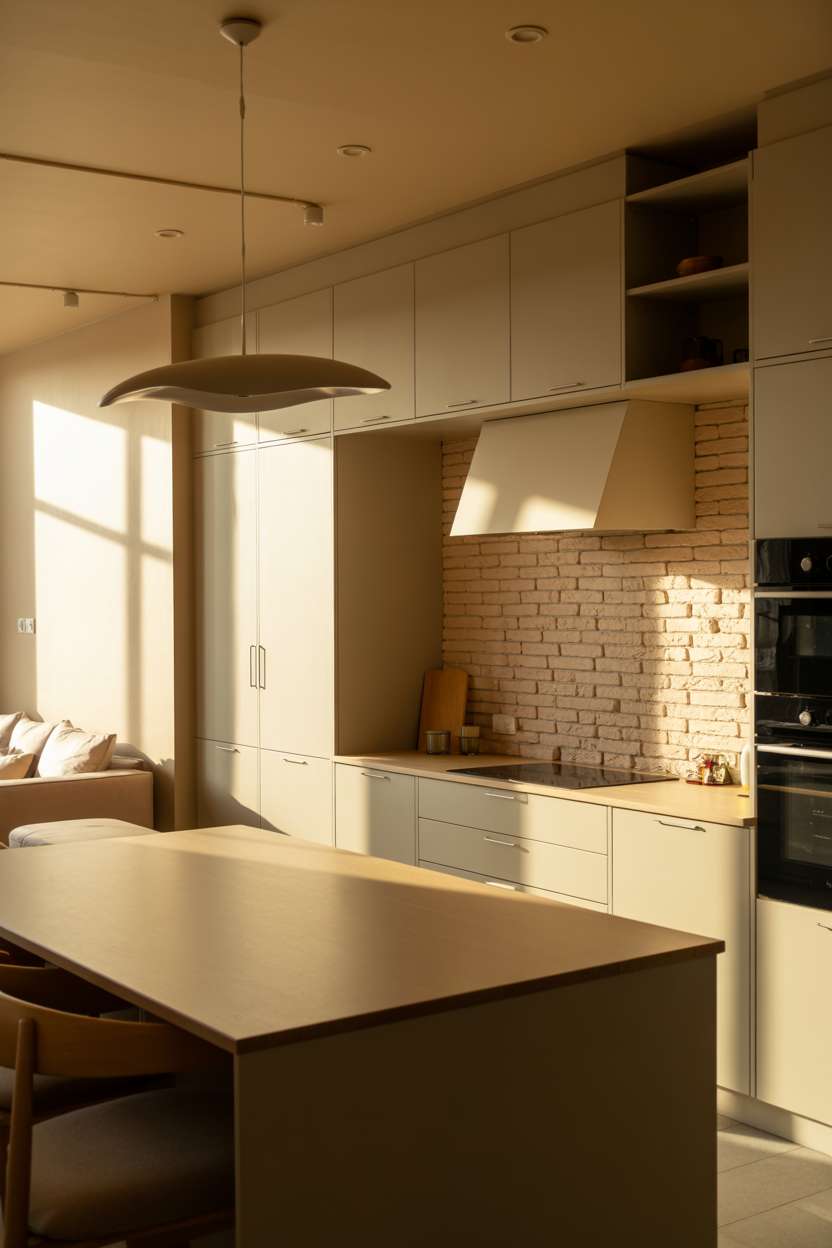
Exposed brick backsplashes add texture and history to modern spaces.
The subtle color variation breaks up the monochrome palette while remaining neutral.
This approach works well in loft conversions or homes with architectural character to preserve.
Brass Hardware Warmth
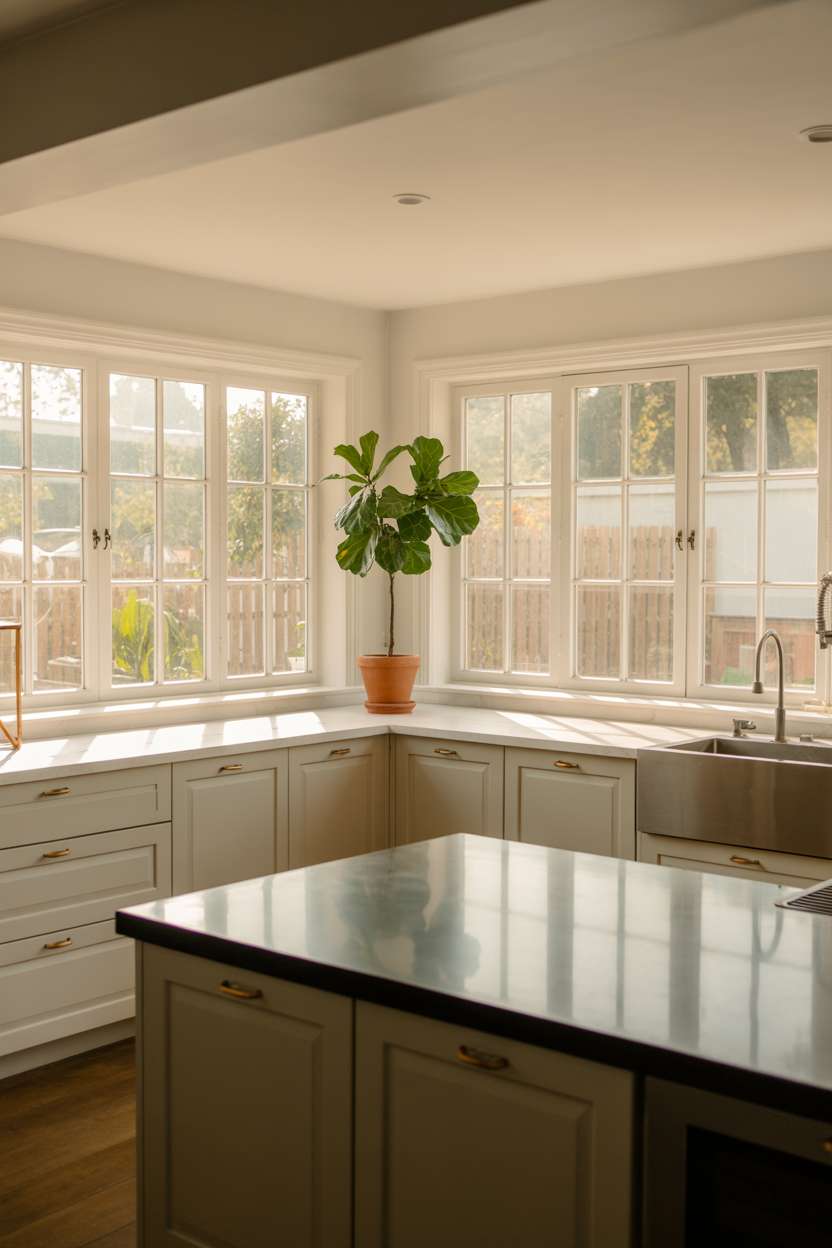
Brushed brass hardware introduces warmth without overwhelming the design.
The large fiddle-leaf fig creates a dramatic green statement that changes with the seasons.
This combination of warm metals and lush plants creates inviting atmospheres within minimalist frameworks.
Central Island Focus
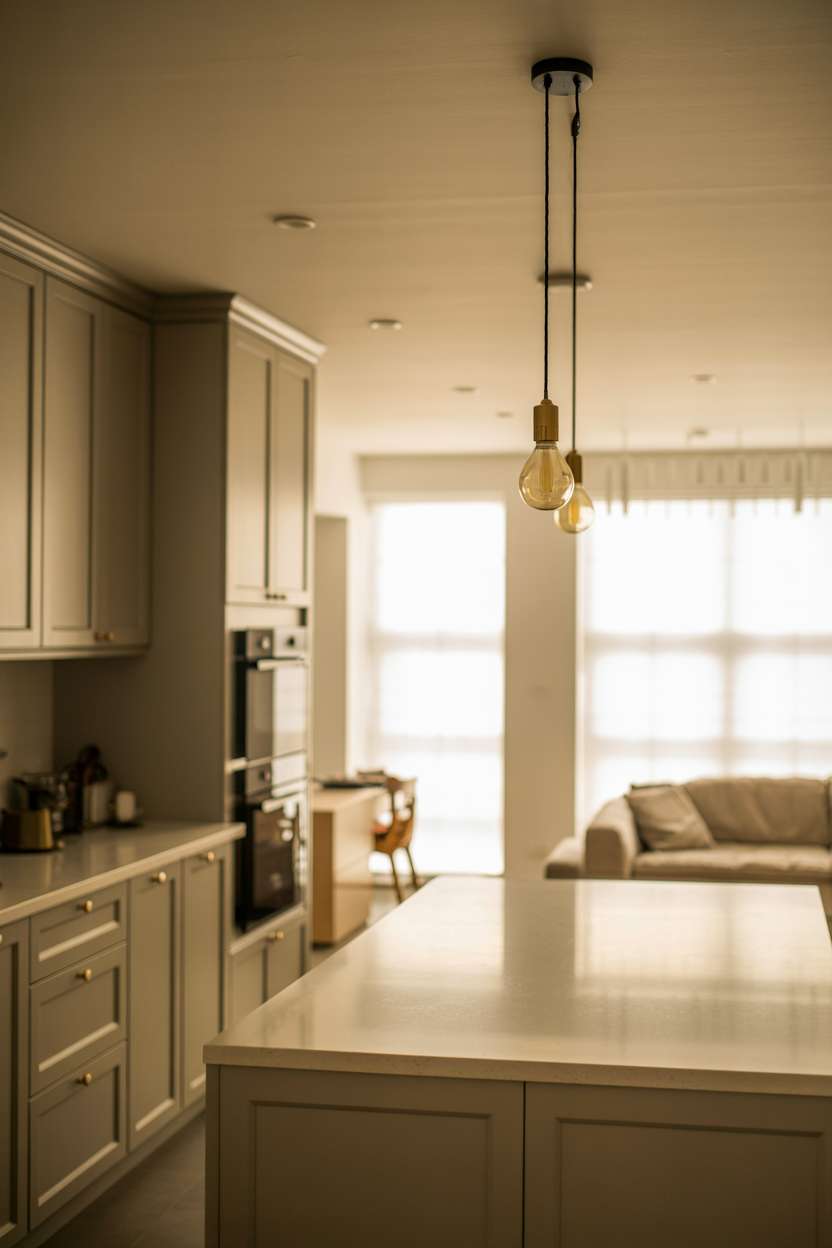
Waterfall edges work particularly well on islands where they’re visible from multiple angles.
The Edison-style bulb provides warm task lighting while serving as a design element.
This central positioning makes islands natural gathering spots for family and guests.
Woven Texture Contrast
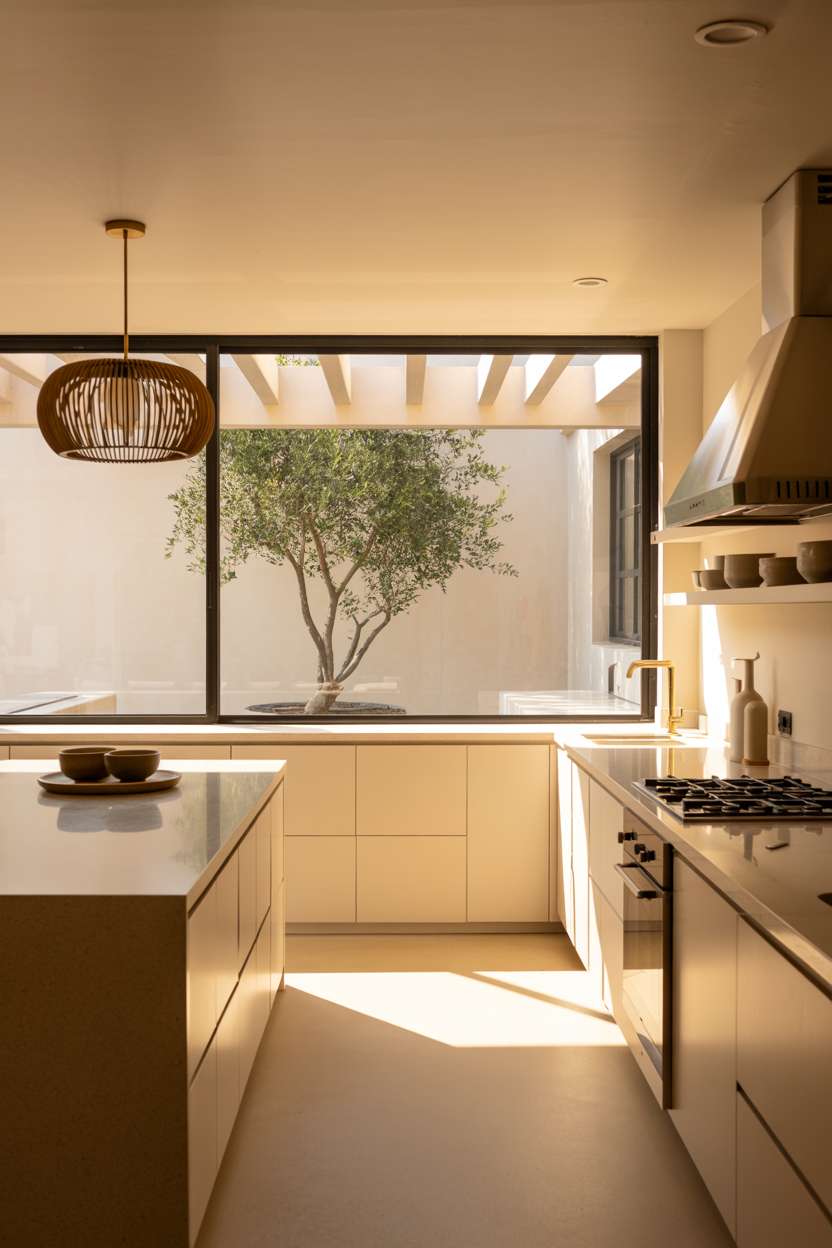
Woven pendant shades introduce natural textures that soften hard surfaces.
The material choice complements outdoor views and brings organic elements indoors.
Ceramic bowls displayed on islands suggest active cooking while maintaining the clean aesthetic.
Geometric Pattern Subtlety
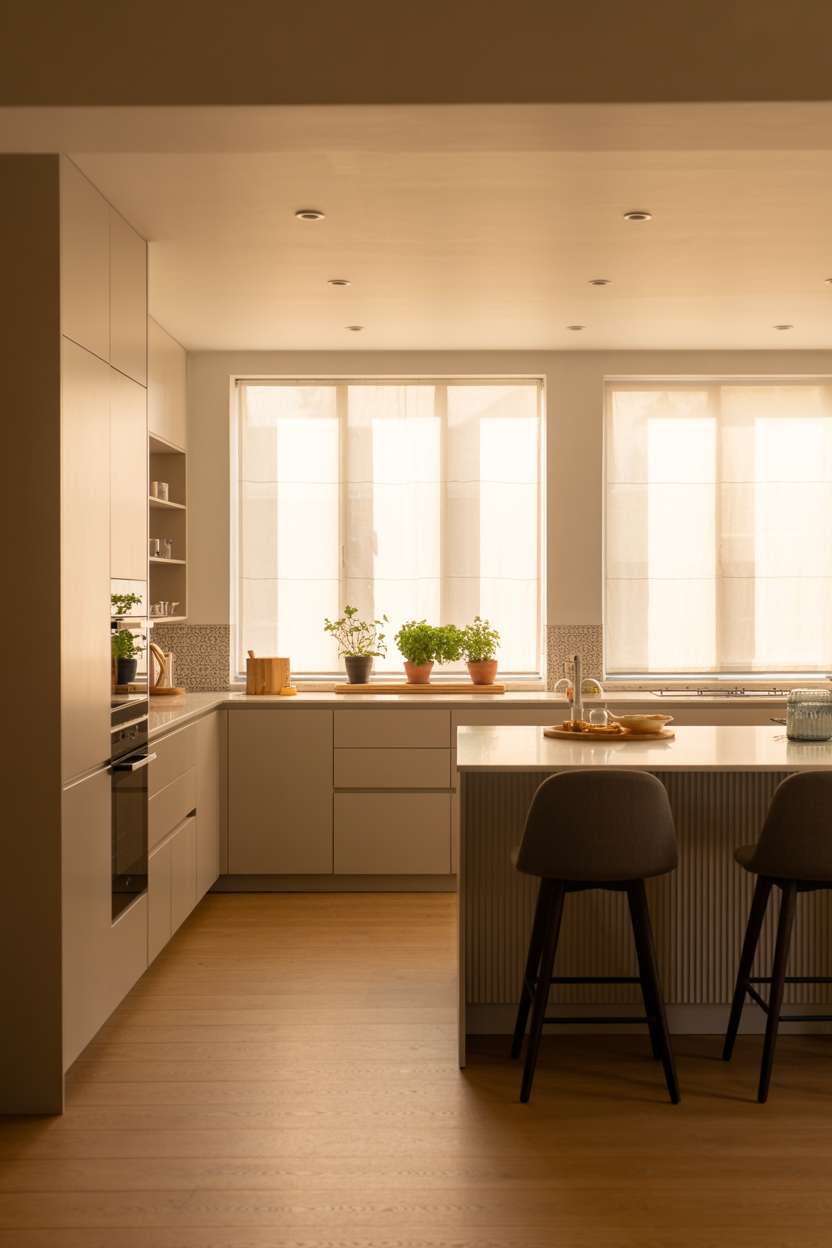
Subtle geometric patterns add visual interest without overwhelming minimal designs.
The pattern choice should complement rather than compete with the architecture.
Dark gray stools provide comfortable seating while maintaining the monochromatic palette.
Concrete and Wood Fusion
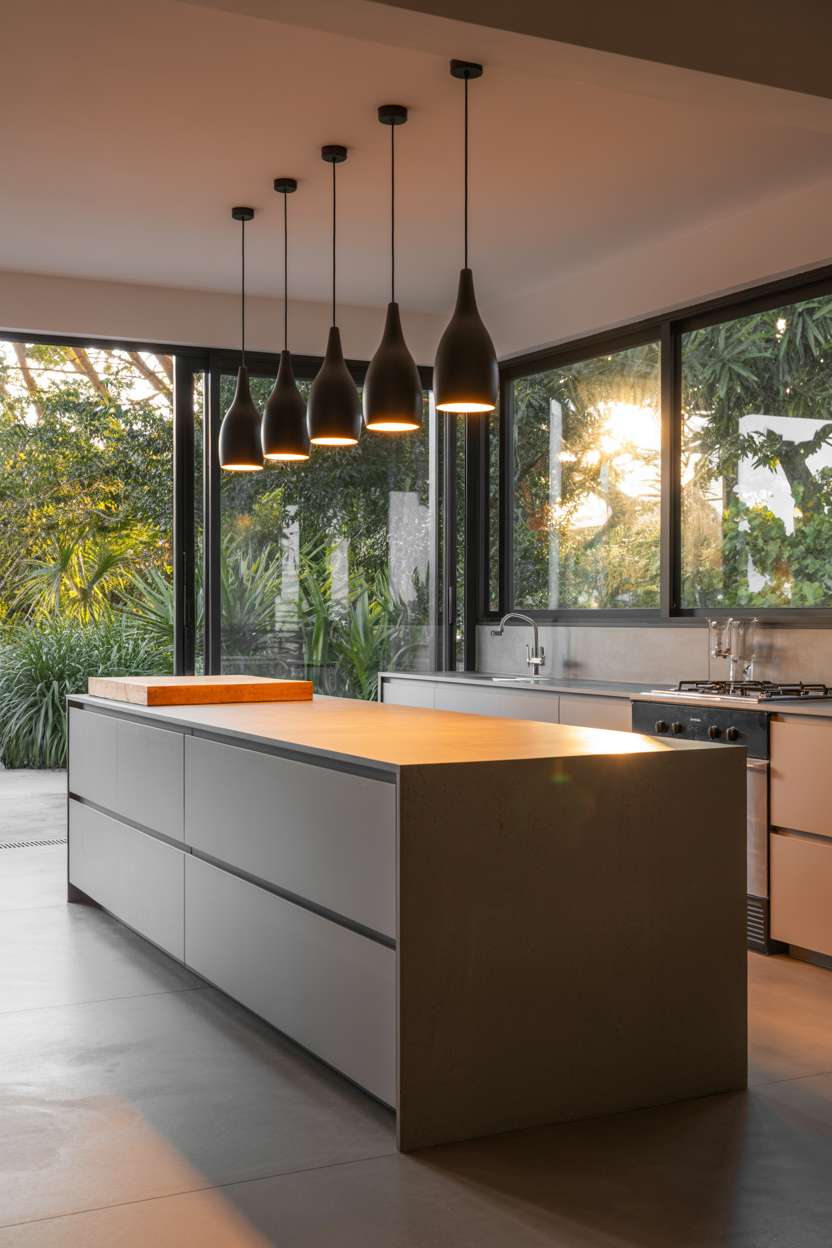
Combining concrete and wood creates beautiful material contrasts.
The warm wood slab softens the industrial concrete base while providing a practical work surface.
Multiple pendant lights ensure adequate task lighting over larger islands.
Linear Lighting Solutions
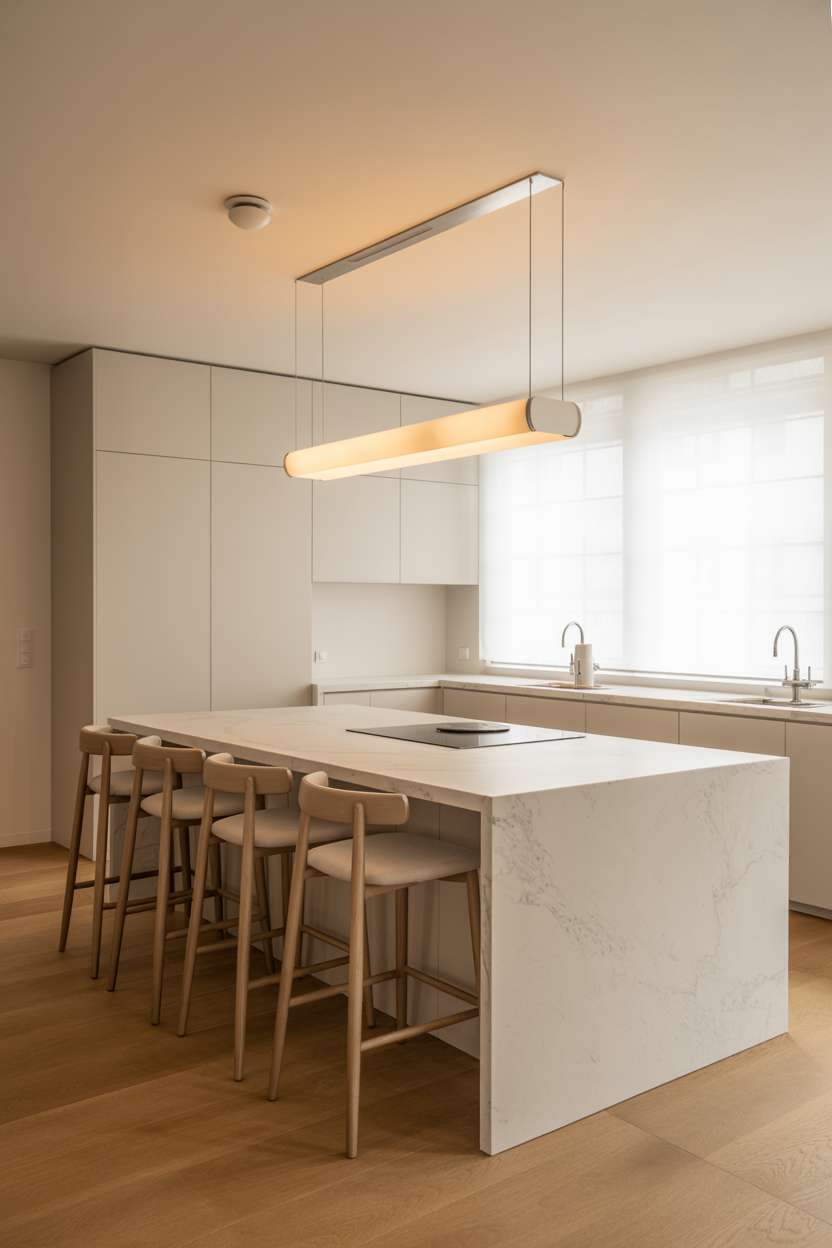
Linear pendant fixtures provide even lighting distribution over long islands.
Built-in cooktops maintain smooth surfaces while offering flexibility for cooking arrangements.
This approach works well for serious home cooks who want professional functionality with clean aesthetics.
Built-in Sink Integration
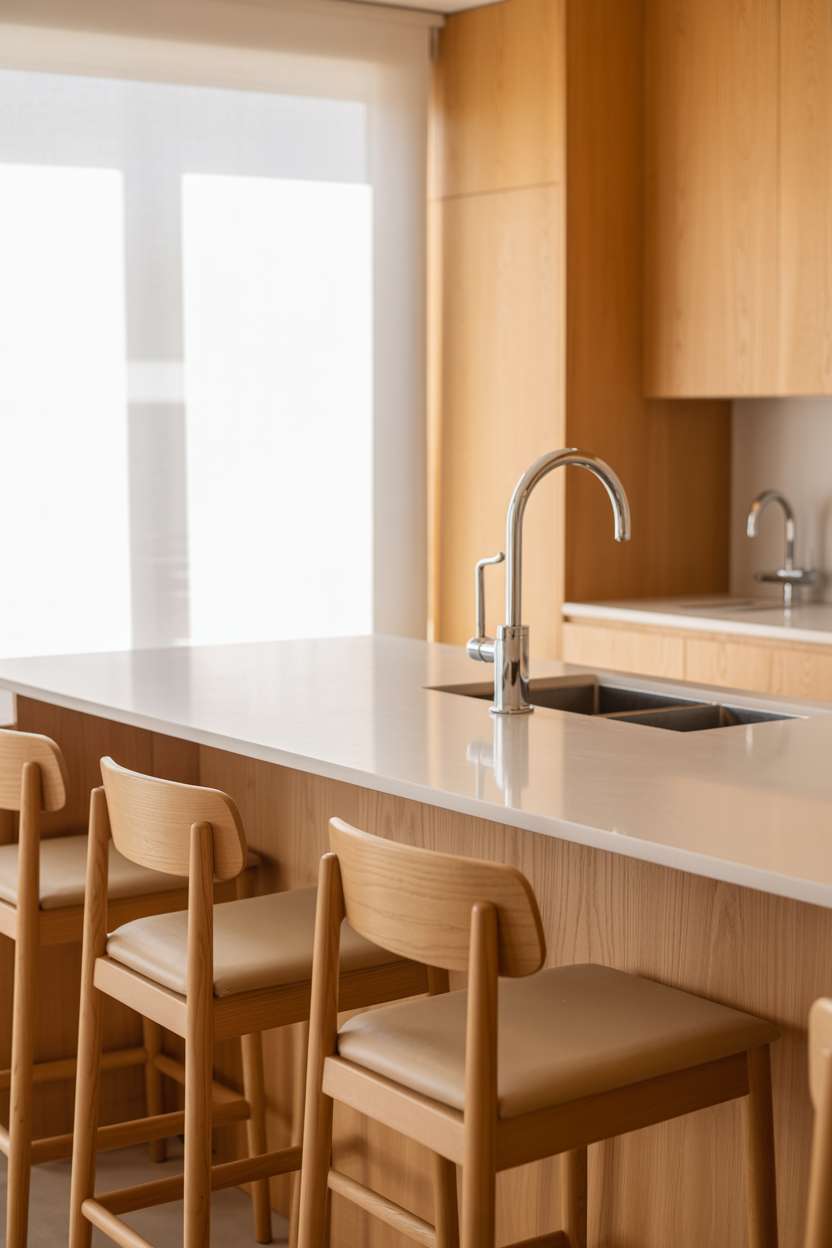
Integrated sinks create seamless surfaces that are easier to clean and maintain.
Chrome faucets complement stainless steel appliances while remaining timeless.
Cushioned stools add comfort for extended breakfast or homework sessions at the island.
Gold Hardware Luxury
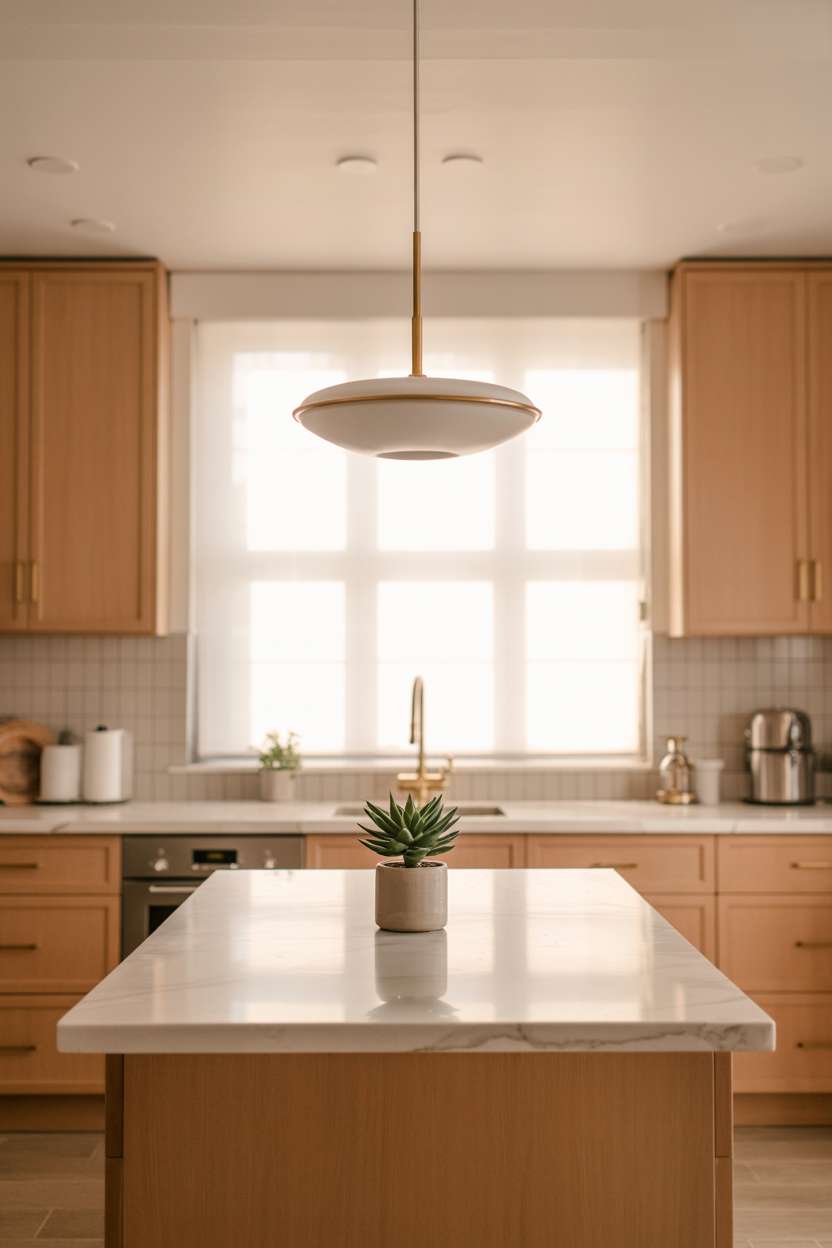
Brushed gold hardware elevates the entire space without adding visual clutter.
The warm metal complements light wood cabinets and creates a cohesive palette.
Single succulents provide green accents that require minimal care while adding life to the space.
Conclusion
Minimalist kitchen design proves that less really can be more.
These spaces demonstrate how careful material selection, thoughtful lighting, and strategic plant placement create environments that are both beautiful and functional.
The key lies in choosing quality over quantity—investing in fewer, better pieces that serve multiple purposes while maintaining visual harmony.
Each of these designs shows a different path toward achieving minimalist perfection, whether through material contrast, natural connections, or subtle textural elements.
The result is always the same: kitchens that feel calm, organized, and timelessly elegant.

